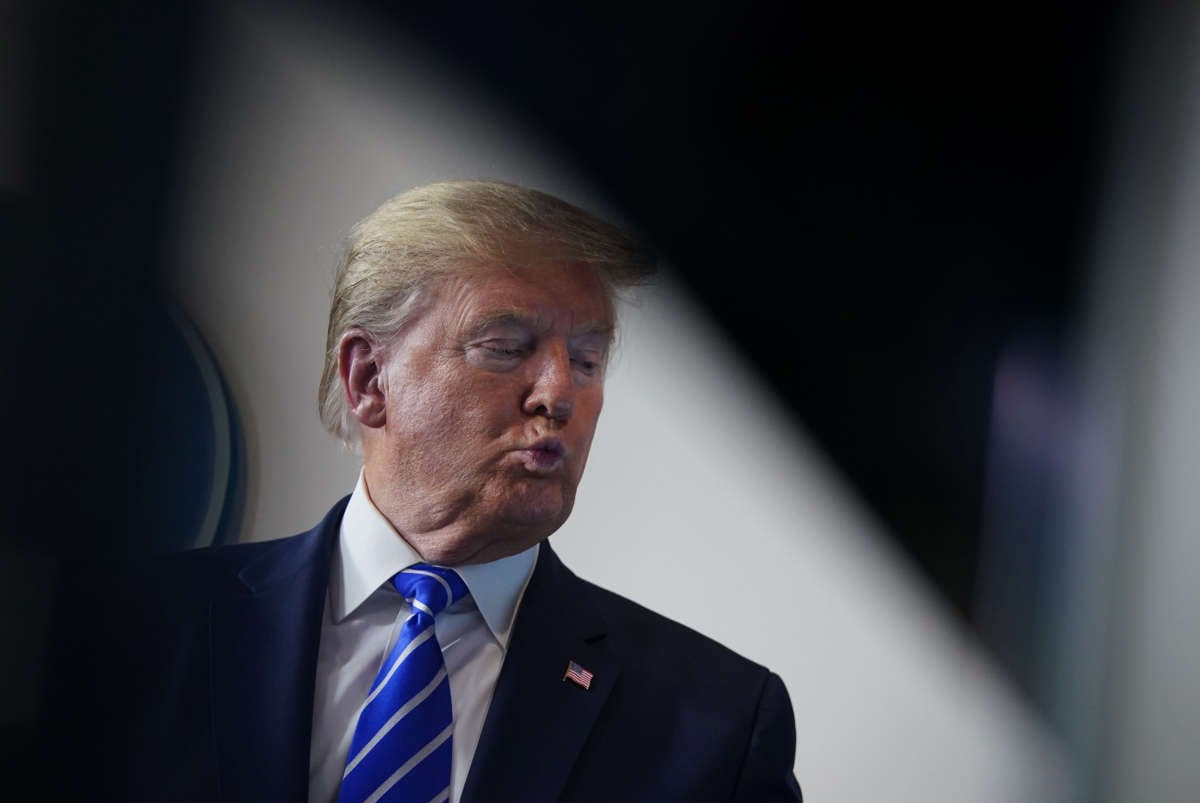In response to the uprising in Minneapolis against the brutal arrest and killing of a Black man named George Floyd by a white police officer earlier this week, President Donald Trump suggested he was ready to use state violence against the protesters, tweeting, “when the looting starts, the shooting starts.”
Trump’s tweets were later flagged by Twitter for “glorifying violence.”
“I can’t stand back & watch this happen to a great American City, Minneapolis,” Trump began in his tweets on Friday morning. He blamed the mayor of Minneapolis for the ongoing protests.
“A total lack of leadership. Either the very weak Radical Left Mayor, Jacob Frey, get his act together and bring the City under control, or I will send in the National Guard & get the job done right,” Trump wrote.
Trump referred to demonstrators against police brutality as “THUGS” who “are dishonoring the memory of George Floyd” and expressed a willingness to use force to crush the uprising.
“Any difficulty and we will assume control, but, when the looting starts, the shooting starts,” the president wrote.
Twitter flagged Trump’s tweets for breaking its rules on promulgating violent actions.
“This Tweet violated the Twitter Rules about glorifying violence,” the company wrote. “However, Twitter has determined that it may be in the public’s interest for the Tweet to remain accessible.”
The official account of the White House also quoted Trump’s earlier tweet, which Twitter also flagged.
Earlier this week, Trump signed an executive order that seeks to regulate Twitter and other social media platforms, a move that came in response to a separate fact-check on another set of tweets from Trump regarding mail-in voting.
Trump’s tweets on Friday morning were denounced for being racist and potentially inciting violence among his most ardent base of supporters. The word “thug” itself is widely recognized to be racist, with some scholars pointing out that the word has become synonymous with using the “n-word” toward Black people.
Journalist and activist Charles Preston took note of Trump’s use of the word “thug” and its recent historical significance.
“Second president in a row to describe Black people uprising as ‘thugs’; Only this time, this President is explicitly signaling death to those resisting,” Preston wrote. “Know this isn’t just a call to the National Guard, but white supremacists that lie in his base.”
Second president in a row to describe Black people uprising as "thugs"; Only this time, this President is explicitly signaling death to those resisting.
Know this isn't just a call to the National Guard, but white supremacists that lie in his base.
— Charles Preston (@_CharlesPreston) May 29, 2020
Author and congressional candidate Qasim Rashid also spoke out against the president’s tweets this morning, noting a stark difference between his response to armed anti-social distancing protesters storming the Michigan state capitol, who were mostly white, and his response to demonstrators protesting the murder of a Black man by law enforcement.
Rather than calling those Michigan protesters “thugs,” Trump referred to them as “very good people” who were deserving of a deal, Rashid noted.
Join us in defending the truth before it’s too late
The future of independent journalism is uncertain, and the consequences of losing it are too grave to ignore. To ensure Truthout remains safe, strong, and free, we need to raise $43,000 in the next 6 days. Every dollar raised goes directly toward the costs of producing news you can trust.
Please give what you can — because by supporting us with a tax-deductible donation, you’re not just preserving a source of news, you’re helping to safeguard what’s left of our democracy.
